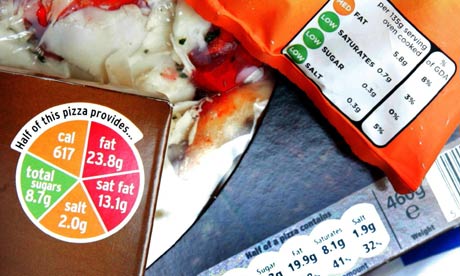
Those who argue that the food and drink companies are endangering our health by loading their products with unnecessary fat, sugar and salt have had little joy from this and previous governments. The Coalition waves the Responsibility Deal in our faces, insisting that leopards are changing their spots. And yes, it is true that some companies have pledged to reduce saturated fat levels and salt, but many of us think what they have achieved so far is little better than cosmetic.
So now that public health - and central to that these days, obesity - has been handed over to local authorities, will they be willing to challenge Big Food in a way that Westminster politicians have resisted?
There is hope. The Local Government Association, representing more than 370 councils in England and Wales, is urging the food and drink giants, as it calls them, and the supermarkets all to sign up to the front of pack, traffic light labelling system that the department of health brought in last June. It's about as clear as labelling can be - with red warnings for high levels of saturated fat, salt and sugar, amber for medium and green for acceptably low levels.
But - as the LGA commendably points out - it's a voluntary scheme and therefore many of the big food and drink companies have quietly ignored it. They include some real giants - Kraft Foods, Kellogg's, Coca-Cola, General Mills, United Biscuits, Heinz and Dairy Crest.
Katie Hall, chair of the LGA's community and wellbeing board, is calling on those companies dragging their feet to get on board:
The 'traffic light' food labelling system is clear, effective and popular with shoppers. The problem is that many food and drink giants have not signed up to it. This means shoppers have to contend with a bewildering number of different systems, many of which are totally confusing.
As a result, shoppers are unwittingly buying products which are laden with fat, salt and sugar, which is fuelling the obesity crisis. It takes on average just 15 seconds for a consumer to decide on a supermarket purchase.
The companies who have not signed up need to step up to plate and allow consumers to make an informed choice on what they eat and drink.Obesity is one of the most serious public health issues facing this country with health problems associated with being overweight or obese costing the country £5 billion every year. Food and drink manufacturers need to do their bit to tackle this growing crisis by committing to standardised food labelling.
Interestingly, the LGA points to research from the consumer analysts, Nielsen, who found that we shop on autopilot, hardly registering what we buy. We spend 15 seconds at the supermarket shelf looking at the breakfast cereal or the tinned soup, we notice less than 40% of products and 80% of us buy something while we are there on impulse.
We need all the help we can get.

